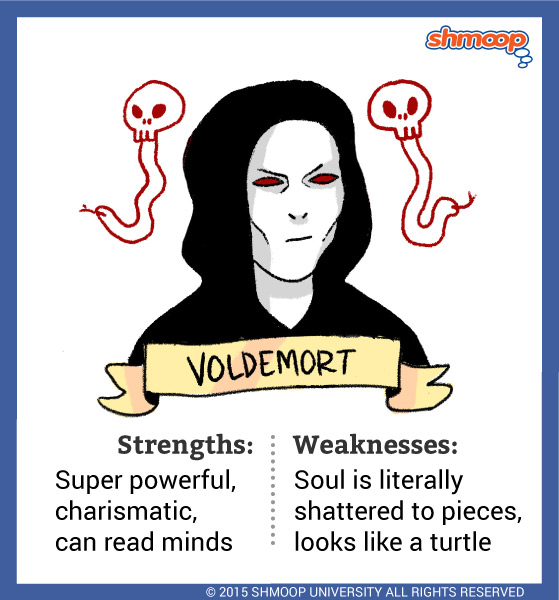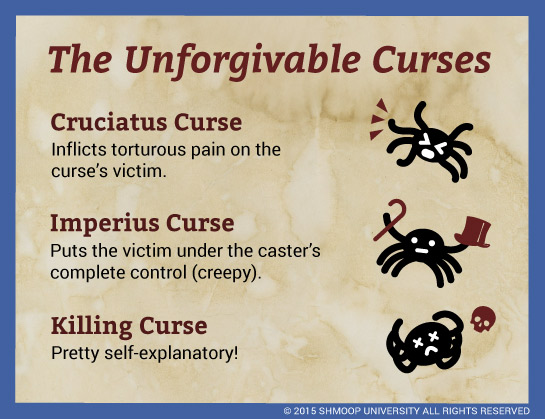Character Analysis

(Click the character infographic to download.)
In Book 5, the war against Voldemort is spent mostly in limbo. We know that Voldemort is back because Harry saw him rise at the end of Book 4; however, the current Minister for Magic, Cornelius Fudge, is too afraid of Voldemort to admit that this is the case. So, he spends most of his administration's energies clamping down on all evidence that Voldemort is back. Afraid of competition, Fudge uses the Daily Prophet to undermine Dumbledore as much as possible. Since Dumbledore is the leader of the Order of the Phoenix and the war effort against Voldemort, Fudge also makes any resistance to Voldemort's rise that much harder. Voldemort is left with a full year to do pretty much whatever he wants under the cover of secrecy.
And Voldemort takes advantage of that year. He starts sending representatives to the giants on the continent, most of whom hate and resent wizards. He has also begun luring the dementors over to his side. Since dementors are creatures attracted to fear and misery, they are naturally going to prefer the death and mayhem that Voldemort promises. Voldemort's friendship with the dementors allows him to commit the largest prison break in Azkaban's history: ten of his worst Death Eaters, including Bellatrix Lestrange, get out of prison and rejoin Voldemort's side.
In fact, Voldemort did not want his return to be popularly known. Harry wasn't supposed to survive the raising ceremony and there were supposed to be no witnesses to Voldemort's return. The fact that Harry lived to tell the tale and alert the Order of the Phoenix was a blow to Voldemort's plans. At the same time, Voldemort – or at least, forces like Fudge, who are attempting to discredit stories of Voldemort's second rise – can use Harry's truth-telling to discredit him as a paranoid fool. The people on the "good" side, people who are not officially supposed to be supporting Voldemort, are divided internally between those who follow Fudge and those who believe Harry and Dumbledore. Even before Voldemort starts operating out in the open, his rise is already sowing disagreement in the wizarding world.
This kind of internal dissent is what marks Voldemort's strategies: he is good at turning allies against each other (witness Peter Pettigrew versus the other Marauders). Instead of working openly against the Ministry, Voldemort sends respectable representatives like Lucius Malfoy with pockets full of gold to buy support for the policies he wants. Voldemort also uses the Imperius Curse, a curse that compels the victim to act at the will of the caster, against two Ministry employees and order members, Broderick Bode and Sturgis Podmore. Voldemort sends both men to try and retrieve the prophecy from the Department of Mysteries, and both of them fail and are killed.

(Click the infographic to download.)
In his continuing campaign to twist good people against one another, Voldemort turns his attentions to Harry himself. He discovers the link that he shares with Harry when he feels Harry in his mind the night that he sends his snake to attack Mr. Weasley in the Department of Mysteries. As soon as Voldemort realizes the connection he shares with Harry, he begins to manipulate Harry into rushing to the Department of Mysteries to get the prophecy for Voldemort. He plays on what Hermione calls Harry's "saving-people thing" (32.54). Harry is always ready to rush in and help if he thinks there's a need. He's reckless, and he loves his friends. Voldemort takes these decent traits and makes them work against Harry by deliberately showing him a vision of Sirius being tortured in the Department of Mysteries. Of course, Harry hurries to the rescue, and of course, it's a trap.
It takes an especially vicious, horrible mind to use the love Harry has for his godfather to lure him into danger, and all for the sake of a prophecy that Voldemort doesn't get to hear anyway. But in the middle of this disastrous visit to the Department of Mysteries, when Harry learns that Voldemort has played his feelings like a violin, we learn something good about Harry's emotion.
Yes, emotions can be manipulated and twisted. But when Voldemort actively possesses Harry during his showdown with Dumbledore, Harry thinks, "death is nothing compared to this ... And I'll see Sirius again [...] And as Harry's heart filled with emotion, the creature's coils loosened, the pain was gone" (36.87-89). Voldemort is chased out of Harry's body not by anything Dumbledore does, but by the power of Harry's own heart. Voldemort knows enough about emotions to know how to twist them, but in the face of a true, uncomplicated feeling, he has to run away. This seems to hint at what "power the Dark Lord knows not" (37.191) that Harry might have.
By the end of Book 5, Cornelius Fudge himself has witnessed Voldemort appearing in the Atrium of the Ministry of Magic. He can no longer deny his return. The Daily Prophet publishes an article praising Harry as "a lone voice of truth" (38.10) and warning of the second rise of the Dark Lord. The end of Book 5 marks the beginning of open war with Voldemort – which tells us that Book 6 is going to get ugly.